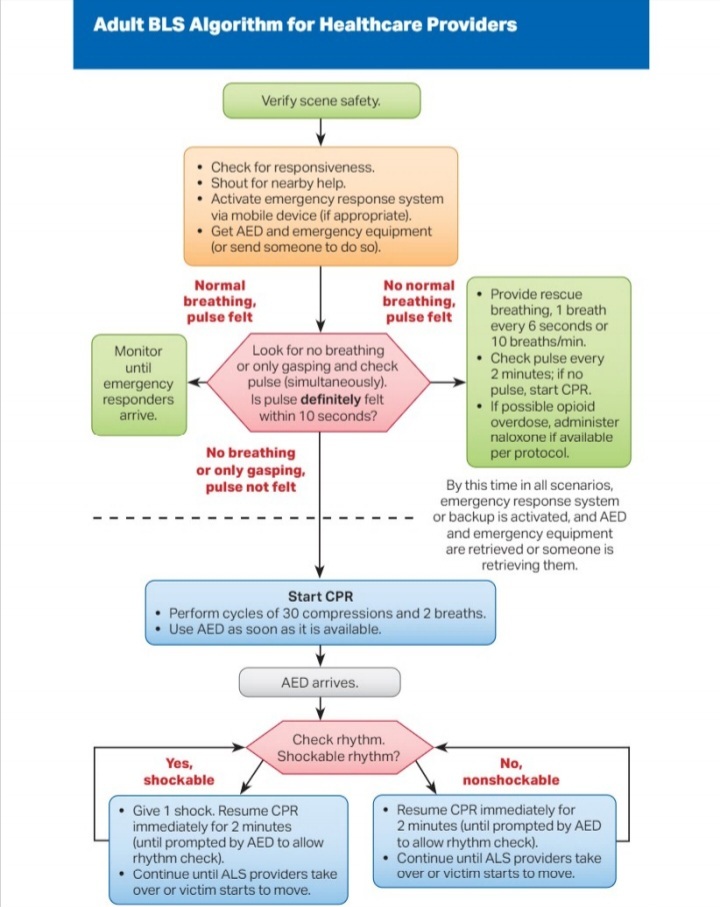(Images can be enlarged if needed)

Cardiac arrest, also known as Sudden Cardiac Arrest, is when the heart stops beating suddenly. The lack of blood flow to the brain and other organs can cause a person to lose consciousness, become disabled or die if not treated immediately.
The terms ‘heart attack’ and ‘cardiac arrest’ are often used interchangeably, but these are two different heart conditions.
A heart attack occurs when there is a blockage in the arteries that stops blood flow in the heart. Due to the lack of blood and oxygen flowing in the heart, the heart muscle tissue will become damaged. Heart attacks can increase the risk for cardiac arrest because heart attacks can alter electrical signals in the heart.
CPR – or Cardiopulmonary Resuscitation – is an emergency lifesaving procedure performed when the heart stops beating. Immediate CPR can double or triple chances of survival after cardiac arrest.
If someone experiences cardiac arrest, they need immediate treatment to increase the flow of oxygen-rich blood to their organs. CPR is the compression over the chest to manually pump a patients heart. Rescue breaths are preformed to provide oxygen to the body.
During CPR, proper hand placement on the lower half of the sternum is crucial. Placing hands over the sternum ensures effective chest compressions directly above the heart, optimizing blood circulation throughout the body.
According to the American Heart Association (AHA), the overall survival rate for out-of-hospital cardiac arrest is around 10%. However, survival rates can be improved if bystander CPR is started immediately. Studies have shown that bystander CPR increases the chances of survival for someone experiencing cardiac arrest. In fact, the AHA reports that survival rates increases to 40% or higher when bystander CPR is performed promptly. The surival rate is between 24% and 40% for those that happen in the hospital, according to the report published online in the Emergency Medicine Journal.
CPR is preformed between 100 - 120 beats per minute. Famously Staying Alive by the Bee Gees is the same beat. A large list of songs with the correct BPM can be found here
![]() The American Red Cross gives the following list of steps to asses if CPR is needed and how to preform:
The American Red Cross gives the following list of steps to asses if CPR is needed and how to preform:
1 CHECK the scene for safety, form an initial impression and use personal protective equipment (PPE)
2 If the person appears unresponsive, CHECK for responsiveness, breathing, life-threatening bleeding or other life-threatening conditions using shout-tap-shout
3 If the person does not respond and is not breathing or only gasping, CALL 9-1-1 and get equipment, or tell someone to do so
4 Kneel beside the person. Place the person on their back on a firm, flat surface
5 The American Red Cross CPR guidelines recommend 100 to 120 chest compressions per minute, 30 at a time. Remember these five points:
Hand position: Two hands centered on the chest
Body position: Shoulders directly over hands; elbows locked
Compression depth: At least 2 inches
Rate of compressions: 100 to 120 per minute
Allow chest to return to normal position after each compression
6
Give 2 breaths
Open the airway to a past-neutral position using the head-tilt/chin-lift technique Pinch the nose shut, take a normal breath, and make complete seal over the person’s mouth with your mouth. Ensure each breath lasts about 1 second and makes the chest rise; allow air to exit before giving the next breath Note: If the 1st breath does not cause the chest to rise, retilt the head and ensure a proper seal before giving the 2nd breath If the 2nd breath does not make the chest rise, an object may be blocking the airway
7 Continue giving sets of 30 chest compressions and 2 breaths. Use an AED as soon as one is available! Minimize interruptions to chest compressions to less than 10 seconds.
Sources:
https://www.hopkinsmedicine.org/health/conditions-and-diseases/cardiac-arrest
https://cpr.heart.org/en/resources/cpr-facts-and-stats
https://www.mycprcertificationonline.com/blog/cpr-success-rate
Instructional images from the AHS Basic Life Support Manual (2020)
Join our public Matrix server! https://matrix.to/#/#tracha:chapo.chat
As a reminder, be sure to properly give content warnings and put sensitive subjects behind proper spoiler tags. It's for the mental health of not just your comrades, but yourself as well.
Here is a screenshot of where to find the spoiler button.



spoiler
Do you find this therapist useful? You don't have to keep attending sessions with him, you're allowed to fire your therapist and find one that you actually get along with
Take those steps, girly!~
spoiler
He seemed like he was useful, before the transition stuff (and he does legitimately seem very knowledgeable?). Now he doesn't really help (what I need is trans support stuff but he just can't/doesn't give me that), but my parents think he's good and they wouldn't want me to switch without a good reason. I am an adult and I know I don't have to explain myself, but they generally give me a lot of grace and I worry that would go away. My dad has already expressed discontent that I'm "still in the same place I was a few years ago" and asked a few times what we're doing.
Thank you
spoiler
Let me guess, your parents are the type to verbally (or maybe non-verbally) indicate to you just how nice, just how patient, just how understanding they're being, and that there are worse parents out there who wouldn't put up with all this! So you should be grateful to them, and not express any discontent because they're already being so nice — and they could be much worse, you know?
... I apologize for projecting. But that just sounded so similar to what my parents say, I kind of couldn't help it. Maybe your parents aren't like this, idk; but what your dad says immediately sets me on edge because it's classic ableist behavior.
talking about abuse/trauma? Just want to be sure I'm tagging it properly, sorry.
Yes, especially as a child. Mostly from my dad. That really brings a lot of my issues together. I really... don't know to what level I should feel grateful to them I guess. I think I'm usually a very grateful person.
This is what and how I am always thinking. He sets me on edge a lot too.
No, you're good, thank you for saying something. Its all a lot for me and this is very productive thing for me to think about.
spoiler
Parents not berating children for mental health issues is like, the bare minimum of being a parent. And they are still making you feel bad about it, in their own way. It's a parent's responsibility to care for their kid, and if they're trying to hold that over you as leverage, that's shitty of them and I'm sorry that you're going through that.
Mood, if anything I've regressed considerably (shit happened since 2020).
You're still valid. We'll get through this... I also need to actually work on it. Just wanted to say I get it (struggle with depression/dysfunction/inertia with basically evereything). Thinking about where we can and will be maybe will help, it does for me on some level.